Reflective Writing: Challenges in Elderly Healthcare
VerifiedAdded on 2019/10/30
|7
|1503
|138
Essay
AI Summary
This reflective essay examines the challenges healthcare providers face when caring for elderly patients, using the case of a 71-year-old Greek widow named Dorothy as a focal point. Dorothy's case highlights issues such as patient non-compliance, memory loss, and aggressive behavior, often linked to alcohol use and feelings of isolation and being judged. The essay identifies key factors influencing interactions between elderly patients and healthcare providers, including patient behavior and provider competence. It argues that patient cooperation and provider knowledge are crucial but can be challenging. The essay then proposes strategies for modifying perceptions and behaviors to improve healthcare delivery, such as providing options to maintain patient independence and offering training to healthcare providers. The conclusion emphasizes the need for commitment, perseverance, and compassion in elderly care, suggesting that changes in healthcare policy and practice can better equip health workers to handle the unique needs of this population. The essay references several academic sources to support its claims and offers a comprehensive overview of the topic.
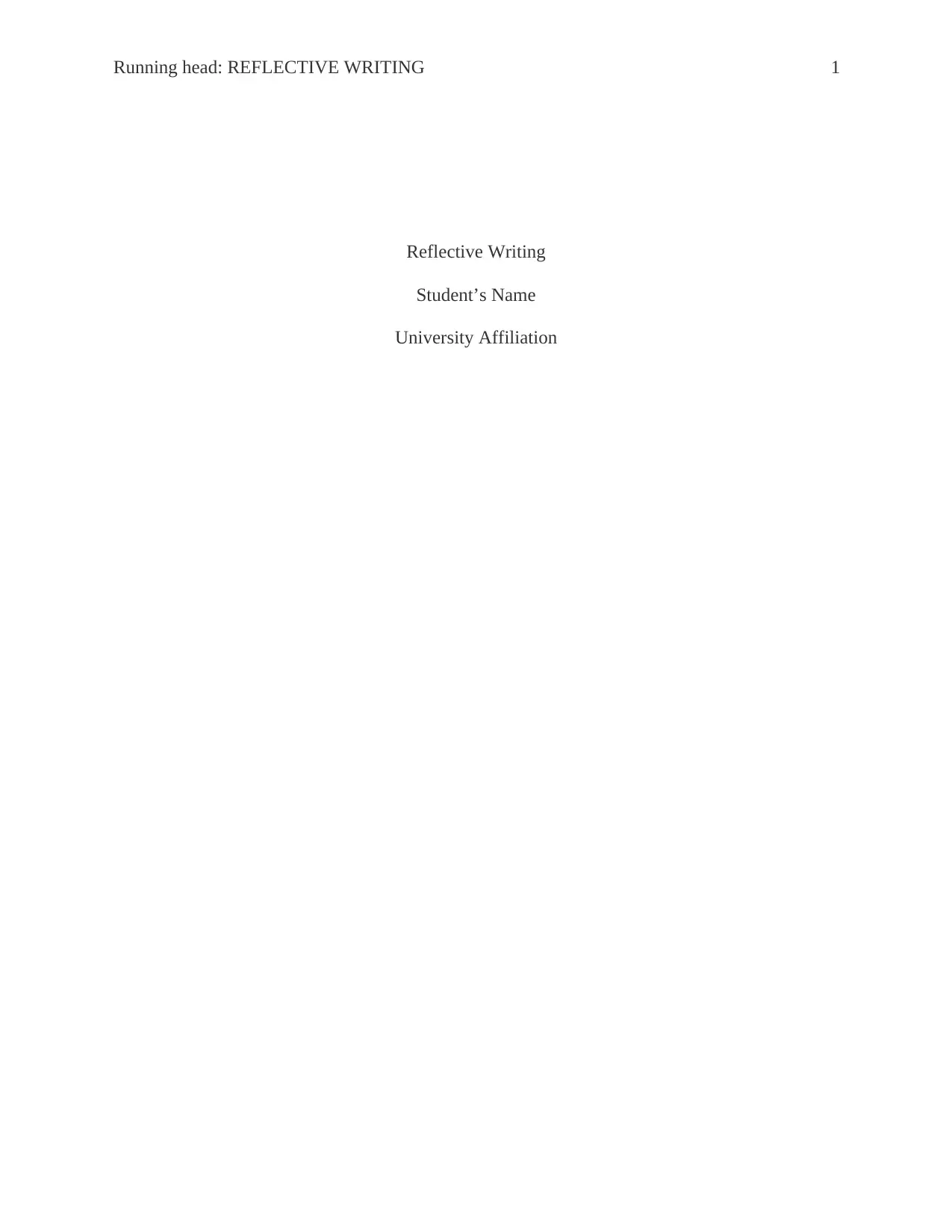
Running head: REFLECTIVE WRITING 1
Reflective Writing
Student’s Name
University Affiliation
Reflective Writing
Student’s Name
University Affiliation
Paraphrase This Document
Need a fresh take? Get an instant paraphrase of this document with our AI Paraphraser
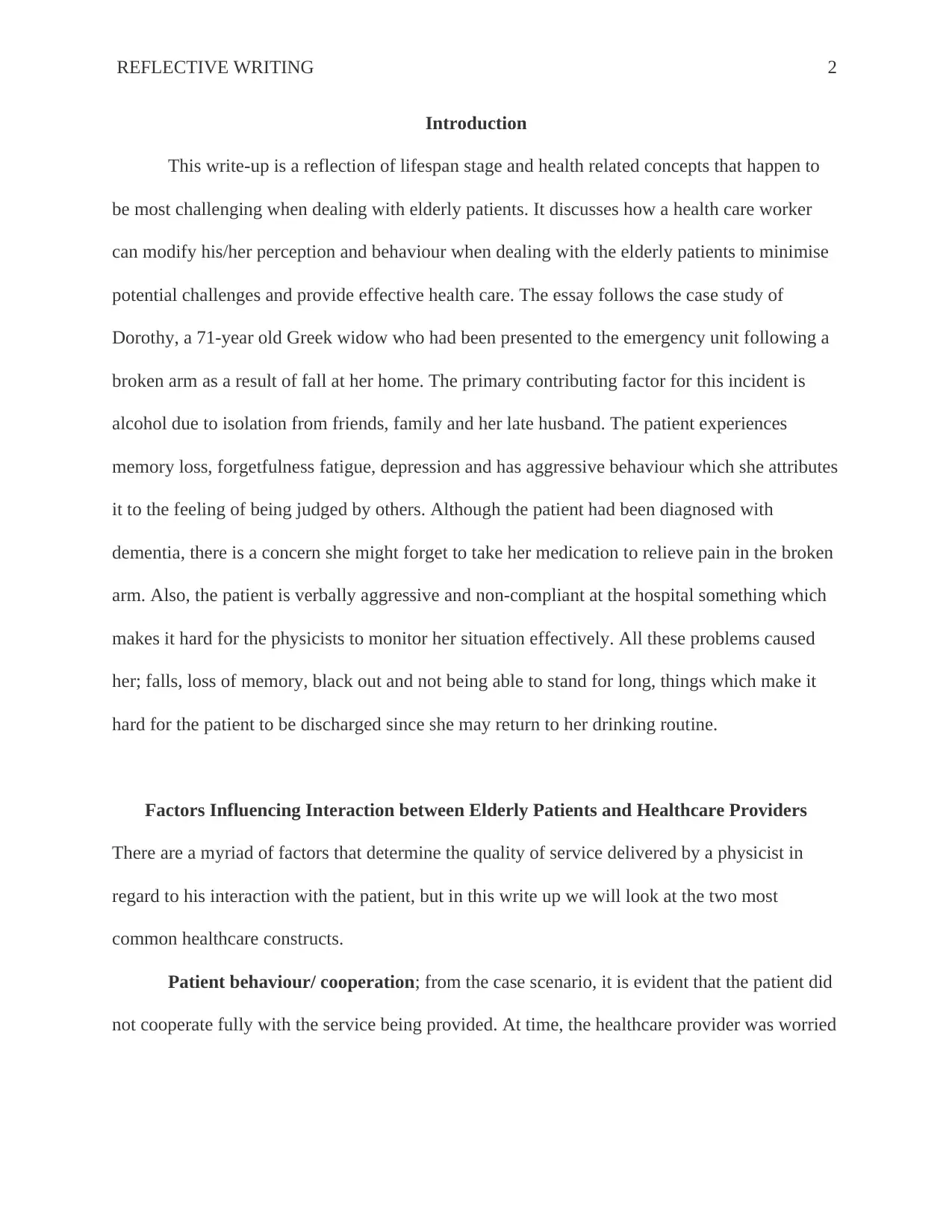
REFLECTIVE WRITING 2
Introduction
This write-up is a reflection of lifespan stage and health related concepts that happen to
be most challenging when dealing with elderly patients. It discusses how a health care worker
can modify his/her perception and behaviour when dealing with the elderly patients to minimise
potential challenges and provide effective health care. The essay follows the case study of
Dorothy, a 71-year old Greek widow who had been presented to the emergency unit following a
broken arm as a result of fall at her home. The primary contributing factor for this incident is
alcohol due to isolation from friends, family and her late husband. The patient experiences
memory loss, forgetfulness fatigue, depression and has aggressive behaviour which she attributes
it to the feeling of being judged by others. Although the patient had been diagnosed with
dementia, there is a concern she might forget to take her medication to relieve pain in the broken
arm. Also, the patient is verbally aggressive and non-compliant at the hospital something which
makes it hard for the physicists to monitor her situation effectively. All these problems caused
her; falls, loss of memory, black out and not being able to stand for long, things which make it
hard for the patient to be discharged since she may return to her drinking routine.
Factors Influencing Interaction between Elderly Patients and Healthcare Providers
There are a myriad of factors that determine the quality of service delivered by a physicist in
regard to his interaction with the patient, but in this write up we will look at the two most
common healthcare constructs.
Patient behaviour/ cooperation; from the case scenario, it is evident that the patient did
not cooperate fully with the service being provided. At time, the healthcare provider was worried
Introduction
This write-up is a reflection of lifespan stage and health related concepts that happen to
be most challenging when dealing with elderly patients. It discusses how a health care worker
can modify his/her perception and behaviour when dealing with the elderly patients to minimise
potential challenges and provide effective health care. The essay follows the case study of
Dorothy, a 71-year old Greek widow who had been presented to the emergency unit following a
broken arm as a result of fall at her home. The primary contributing factor for this incident is
alcohol due to isolation from friends, family and her late husband. The patient experiences
memory loss, forgetfulness fatigue, depression and has aggressive behaviour which she attributes
it to the feeling of being judged by others. Although the patient had been diagnosed with
dementia, there is a concern she might forget to take her medication to relieve pain in the broken
arm. Also, the patient is verbally aggressive and non-compliant at the hospital something which
makes it hard for the physicists to monitor her situation effectively. All these problems caused
her; falls, loss of memory, black out and not being able to stand for long, things which make it
hard for the patient to be discharged since she may return to her drinking routine.
Factors Influencing Interaction between Elderly Patients and Healthcare Providers
There are a myriad of factors that determine the quality of service delivered by a physicist in
regard to his interaction with the patient, but in this write up we will look at the two most
common healthcare constructs.
Patient behaviour/ cooperation; from the case scenario, it is evident that the patient did
not cooperate fully with the service being provided. At time, the healthcare provider was worried
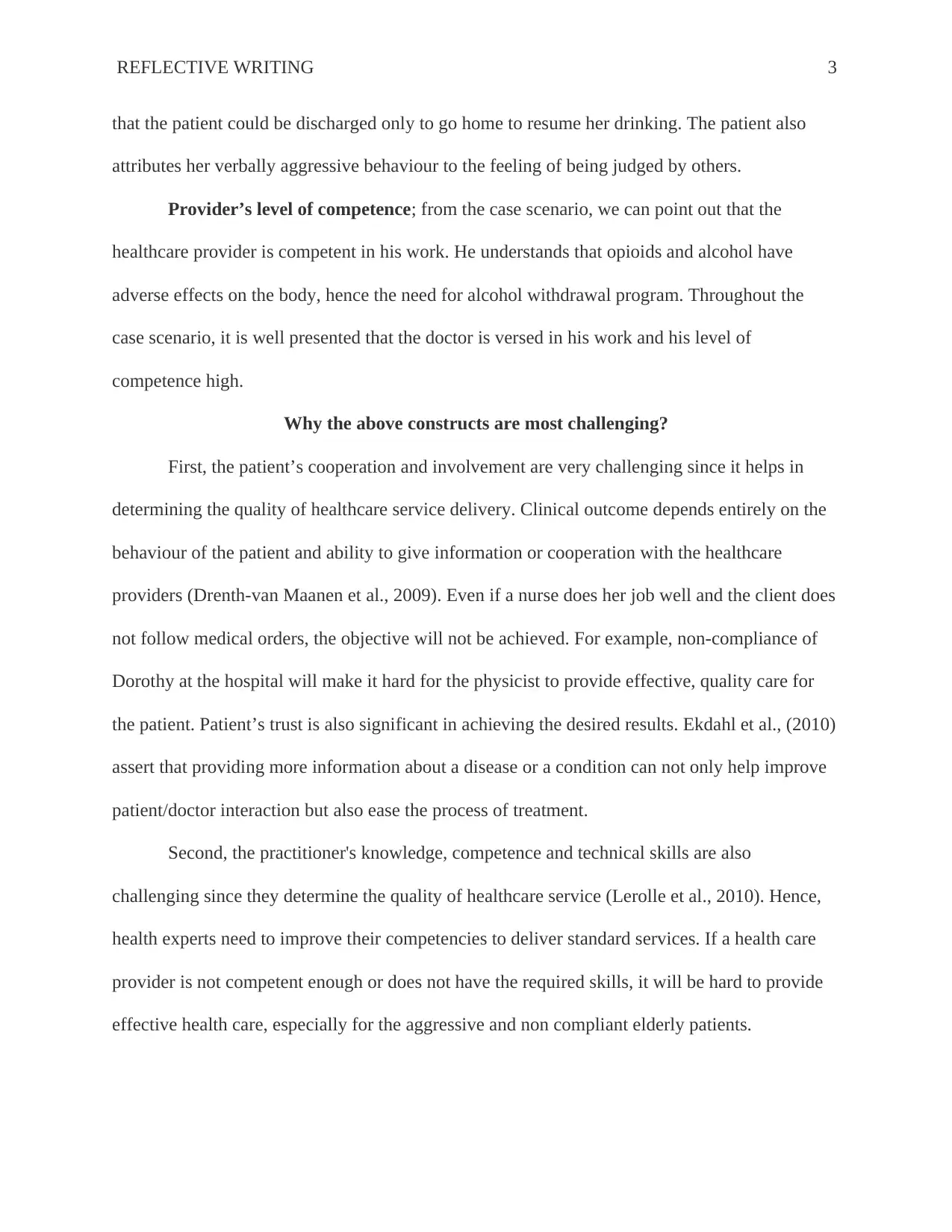
REFLECTIVE WRITING 3
that the patient could be discharged only to go home to resume her drinking. The patient also
attributes her verbally aggressive behaviour to the feeling of being judged by others.
Provider’s level of competence; from the case scenario, we can point out that the
healthcare provider is competent in his work. He understands that opioids and alcohol have
adverse effects on the body, hence the need for alcohol withdrawal program. Throughout the
case scenario, it is well presented that the doctor is versed in his work and his level of
competence high.
Why the above constructs are most challenging?
First, the patient’s cooperation and involvement are very challenging since it helps in
determining the quality of healthcare service delivery. Clinical outcome depends entirely on the
behaviour of the patient and ability to give information or cooperation with the healthcare
providers (Drenth-van Maanen et al., 2009). Even if a nurse does her job well and the client does
not follow medical orders, the objective will not be achieved. For example, non-compliance of
Dorothy at the hospital will make it hard for the physicist to provide effective, quality care for
the patient. Patient’s trust is also significant in achieving the desired results. Ekdahl et al., (2010)
assert that providing more information about a disease or a condition can not only help improve
patient/doctor interaction but also ease the process of treatment.
Second, the practitioner's knowledge, competence and technical skills are also
challenging since they determine the quality of healthcare service (Lerolle et al., 2010). Hence,
health experts need to improve their competencies to deliver standard services. If a health care
provider is not competent enough or does not have the required skills, it will be hard to provide
effective health care, especially for the aggressive and non compliant elderly patients.
that the patient could be discharged only to go home to resume her drinking. The patient also
attributes her verbally aggressive behaviour to the feeling of being judged by others.
Provider’s level of competence; from the case scenario, we can point out that the
healthcare provider is competent in his work. He understands that opioids and alcohol have
adverse effects on the body, hence the need for alcohol withdrawal program. Throughout the
case scenario, it is well presented that the doctor is versed in his work and his level of
competence high.
Why the above constructs are most challenging?
First, the patient’s cooperation and involvement are very challenging since it helps in
determining the quality of healthcare service delivery. Clinical outcome depends entirely on the
behaviour of the patient and ability to give information or cooperation with the healthcare
providers (Drenth-van Maanen et al., 2009). Even if a nurse does her job well and the client does
not follow medical orders, the objective will not be achieved. For example, non-compliance of
Dorothy at the hospital will make it hard for the physicist to provide effective, quality care for
the patient. Patient’s trust is also significant in achieving the desired results. Ekdahl et al., (2010)
assert that providing more information about a disease or a condition can not only help improve
patient/doctor interaction but also ease the process of treatment.
Second, the practitioner's knowledge, competence and technical skills are also
challenging since they determine the quality of healthcare service (Lerolle et al., 2010). Hence,
health experts need to improve their competencies to deliver standard services. If a health care
provider is not competent enough or does not have the required skills, it will be hard to provide
effective health care, especially for the aggressive and non compliant elderly patients.
⊘ This is a preview!⊘
Do you want full access?
Subscribe today to unlock all pages.

Trusted by 1+ million students worldwide
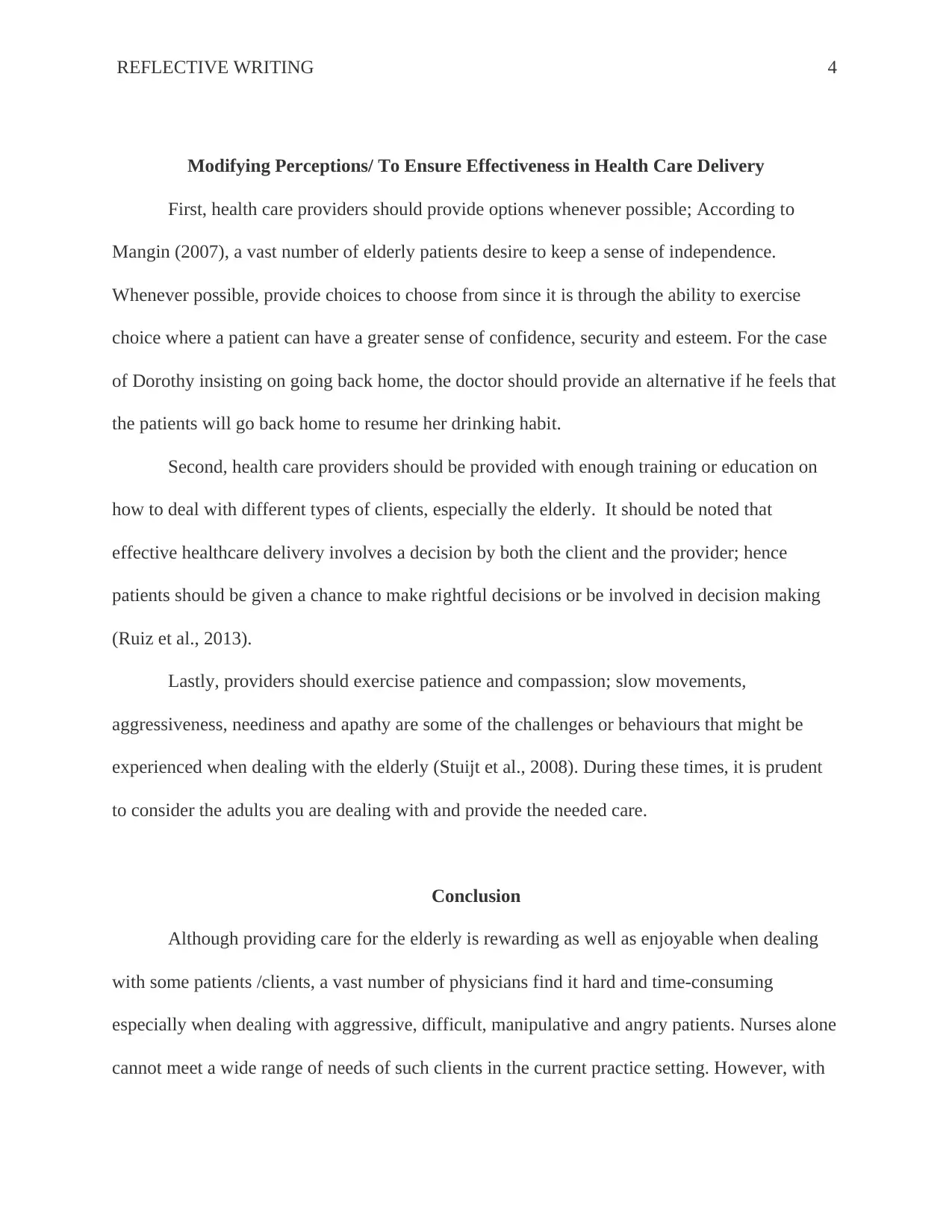
REFLECTIVE WRITING 4
Modifying Perceptions/ To Ensure Effectiveness in Health Care Delivery
First, health care providers should provide options whenever possible; According to
Mangin (2007), a vast number of elderly patients desire to keep a sense of independence.
Whenever possible, provide choices to choose from since it is through the ability to exercise
choice where a patient can have a greater sense of confidence, security and esteem. For the case
of Dorothy insisting on going back home, the doctor should provide an alternative if he feels that
the patients will go back home to resume her drinking habit.
Second, health care providers should be provided with enough training or education on
how to deal with different types of clients, especially the elderly. It should be noted that
effective healthcare delivery involves a decision by both the client and the provider; hence
patients should be given a chance to make rightful decisions or be involved in decision making
(Ruiz et al., 2013).
Lastly, providers should exercise patience and compassion; slow movements,
aggressiveness, neediness and apathy are some of the challenges or behaviours that might be
experienced when dealing with the elderly (Stuijt et al., 2008). During these times, it is prudent
to consider the adults you are dealing with and provide the needed care.
Conclusion
Although providing care for the elderly is rewarding as well as enjoyable when dealing
with some patients /clients, a vast number of physicians find it hard and time-consuming
especially when dealing with aggressive, difficult, manipulative and angry patients. Nurses alone
cannot meet a wide range of needs of such clients in the current practice setting. However, with
Modifying Perceptions/ To Ensure Effectiveness in Health Care Delivery
First, health care providers should provide options whenever possible; According to
Mangin (2007), a vast number of elderly patients desire to keep a sense of independence.
Whenever possible, provide choices to choose from since it is through the ability to exercise
choice where a patient can have a greater sense of confidence, security and esteem. For the case
of Dorothy insisting on going back home, the doctor should provide an alternative if he feels that
the patients will go back home to resume her drinking habit.
Second, health care providers should be provided with enough training or education on
how to deal with different types of clients, especially the elderly. It should be noted that
effective healthcare delivery involves a decision by both the client and the provider; hence
patients should be given a chance to make rightful decisions or be involved in decision making
(Ruiz et al., 2013).
Lastly, providers should exercise patience and compassion; slow movements,
aggressiveness, neediness and apathy are some of the challenges or behaviours that might be
experienced when dealing with the elderly (Stuijt et al., 2008). During these times, it is prudent
to consider the adults you are dealing with and provide the needed care.
Conclusion
Although providing care for the elderly is rewarding as well as enjoyable when dealing
with some patients /clients, a vast number of physicians find it hard and time-consuming
especially when dealing with aggressive, difficult, manipulative and angry patients. Nurses alone
cannot meet a wide range of needs of such clients in the current practice setting. However, with
Paraphrase This Document
Need a fresh take? Get an instant paraphrase of this document with our AI Paraphraser
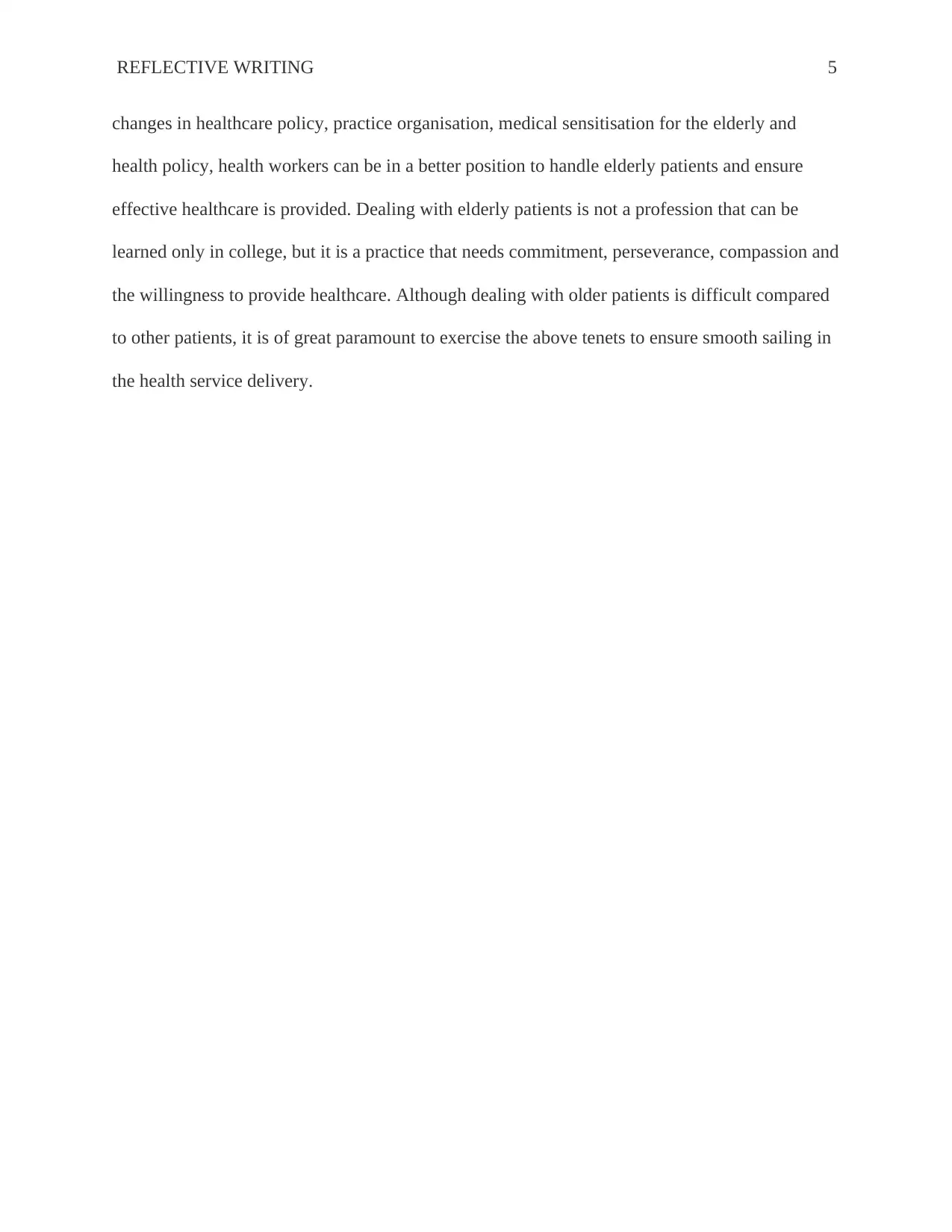
REFLECTIVE WRITING 5
changes in healthcare policy, practice organisation, medical sensitisation for the elderly and
health policy, health workers can be in a better position to handle elderly patients and ensure
effective healthcare is provided. Dealing with elderly patients is not a profession that can be
learned only in college, but it is a practice that needs commitment, perseverance, compassion and
the willingness to provide healthcare. Although dealing with older patients is difficult compared
to other patients, it is of great paramount to exercise the above tenets to ensure smooth sailing in
the health service delivery.
changes in healthcare policy, practice organisation, medical sensitisation for the elderly and
health policy, health workers can be in a better position to handle elderly patients and ensure
effective healthcare is provided. Dealing with elderly patients is not a profession that can be
learned only in college, but it is a practice that needs commitment, perseverance, compassion and
the willingness to provide healthcare. Although dealing with older patients is difficult compared
to other patients, it is of great paramount to exercise the above tenets to ensure smooth sailing in
the health service delivery.
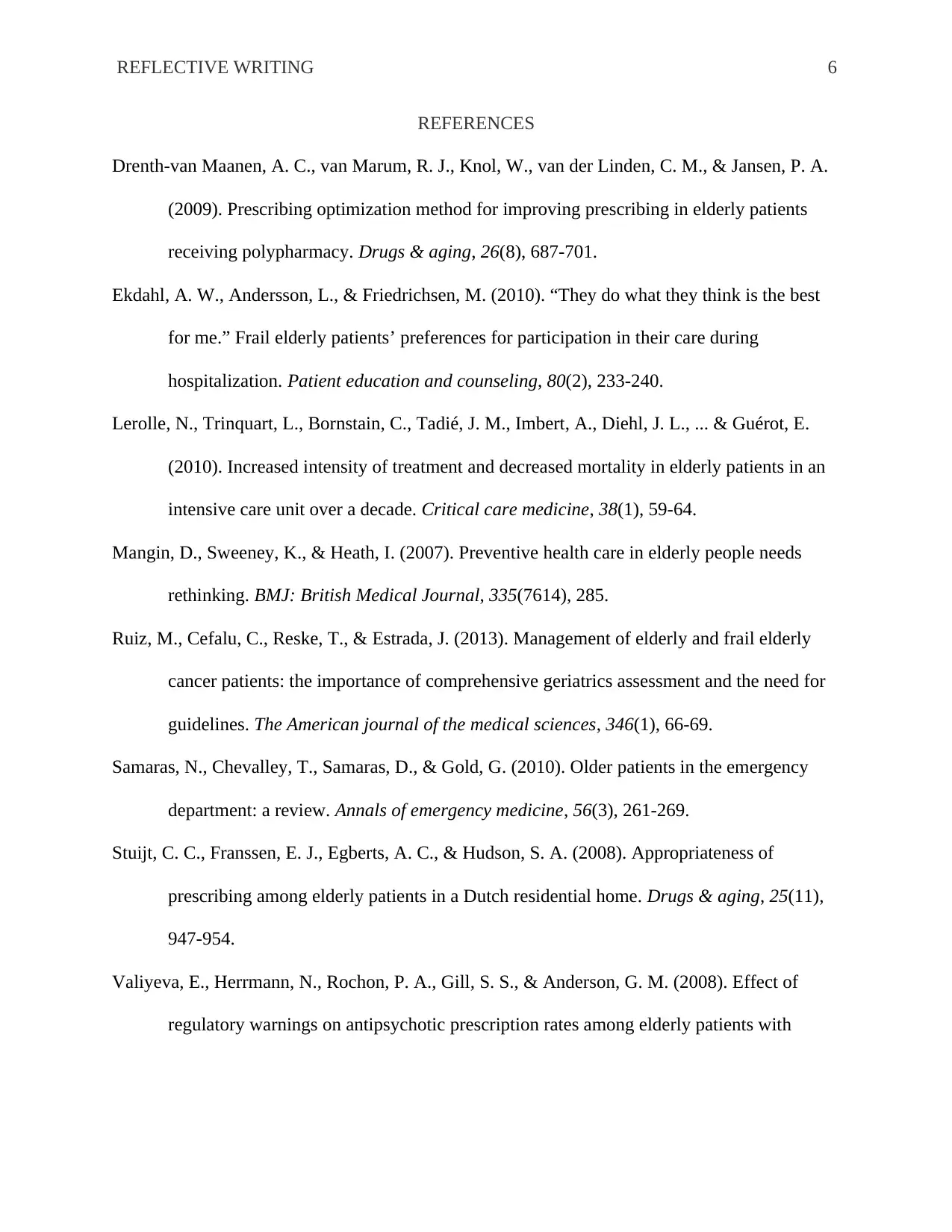
REFLECTIVE WRITING 6
REFERENCES
Drenth-van Maanen, A. C., van Marum, R. J., Knol, W., van der Linden, C. M., & Jansen, P. A.
(2009). Prescribing optimization method for improving prescribing in elderly patients
receiving polypharmacy. Drugs & aging, 26(8), 687-701.
Ekdahl, A. W., Andersson, L., & Friedrichsen, M. (2010). “They do what they think is the best
for me.” Frail elderly patients’ preferences for participation in their care during
hospitalization. Patient education and counseling, 80(2), 233-240.
Lerolle, N., Trinquart, L., Bornstain, C., Tadié, J. M., Imbert, A., Diehl, J. L., ... & Guérot, E.
(2010). Increased intensity of treatment and decreased mortality in elderly patients in an
intensive care unit over a decade. Critical care medicine, 38(1), 59-64.
Mangin, D., Sweeney, K., & Heath, I. (2007). Preventive health care in elderly people needs
rethinking. BMJ: British Medical Journal, 335(7614), 285.
Ruiz, M., Cefalu, C., Reske, T., & Estrada, J. (2013). Management of elderly and frail elderly
cancer patients: the importance of comprehensive geriatrics assessment and the need for
guidelines. The American journal of the medical sciences, 346(1), 66-69.
Samaras, N., Chevalley, T., Samaras, D., & Gold, G. (2010). Older patients in the emergency
department: a review. Annals of emergency medicine, 56(3), 261-269.
Stuijt, C. C., Franssen, E. J., Egberts, A. C., & Hudson, S. A. (2008). Appropriateness of
prescribing among elderly patients in a Dutch residential home. Drugs & aging, 25(11),
947-954.
Valiyeva, E., Herrmann, N., Rochon, P. A., Gill, S. S., & Anderson, G. M. (2008). Effect of
regulatory warnings on antipsychotic prescription rates among elderly patients with
REFERENCES
Drenth-van Maanen, A. C., van Marum, R. J., Knol, W., van der Linden, C. M., & Jansen, P. A.
(2009). Prescribing optimization method for improving prescribing in elderly patients
receiving polypharmacy. Drugs & aging, 26(8), 687-701.
Ekdahl, A. W., Andersson, L., & Friedrichsen, M. (2010). “They do what they think is the best
for me.” Frail elderly patients’ preferences for participation in their care during
hospitalization. Patient education and counseling, 80(2), 233-240.
Lerolle, N., Trinquart, L., Bornstain, C., Tadié, J. M., Imbert, A., Diehl, J. L., ... & Guérot, E.
(2010). Increased intensity of treatment and decreased mortality in elderly patients in an
intensive care unit over a decade. Critical care medicine, 38(1), 59-64.
Mangin, D., Sweeney, K., & Heath, I. (2007). Preventive health care in elderly people needs
rethinking. BMJ: British Medical Journal, 335(7614), 285.
Ruiz, M., Cefalu, C., Reske, T., & Estrada, J. (2013). Management of elderly and frail elderly
cancer patients: the importance of comprehensive geriatrics assessment and the need for
guidelines. The American journal of the medical sciences, 346(1), 66-69.
Samaras, N., Chevalley, T., Samaras, D., & Gold, G. (2010). Older patients in the emergency
department: a review. Annals of emergency medicine, 56(3), 261-269.
Stuijt, C. C., Franssen, E. J., Egberts, A. C., & Hudson, S. A. (2008). Appropriateness of
prescribing among elderly patients in a Dutch residential home. Drugs & aging, 25(11),
947-954.
Valiyeva, E., Herrmann, N., Rochon, P. A., Gill, S. S., & Anderson, G. M. (2008). Effect of
regulatory warnings on antipsychotic prescription rates among elderly patients with
⊘ This is a preview!⊘
Do you want full access?
Subscribe today to unlock all pages.

Trusted by 1+ million students worldwide
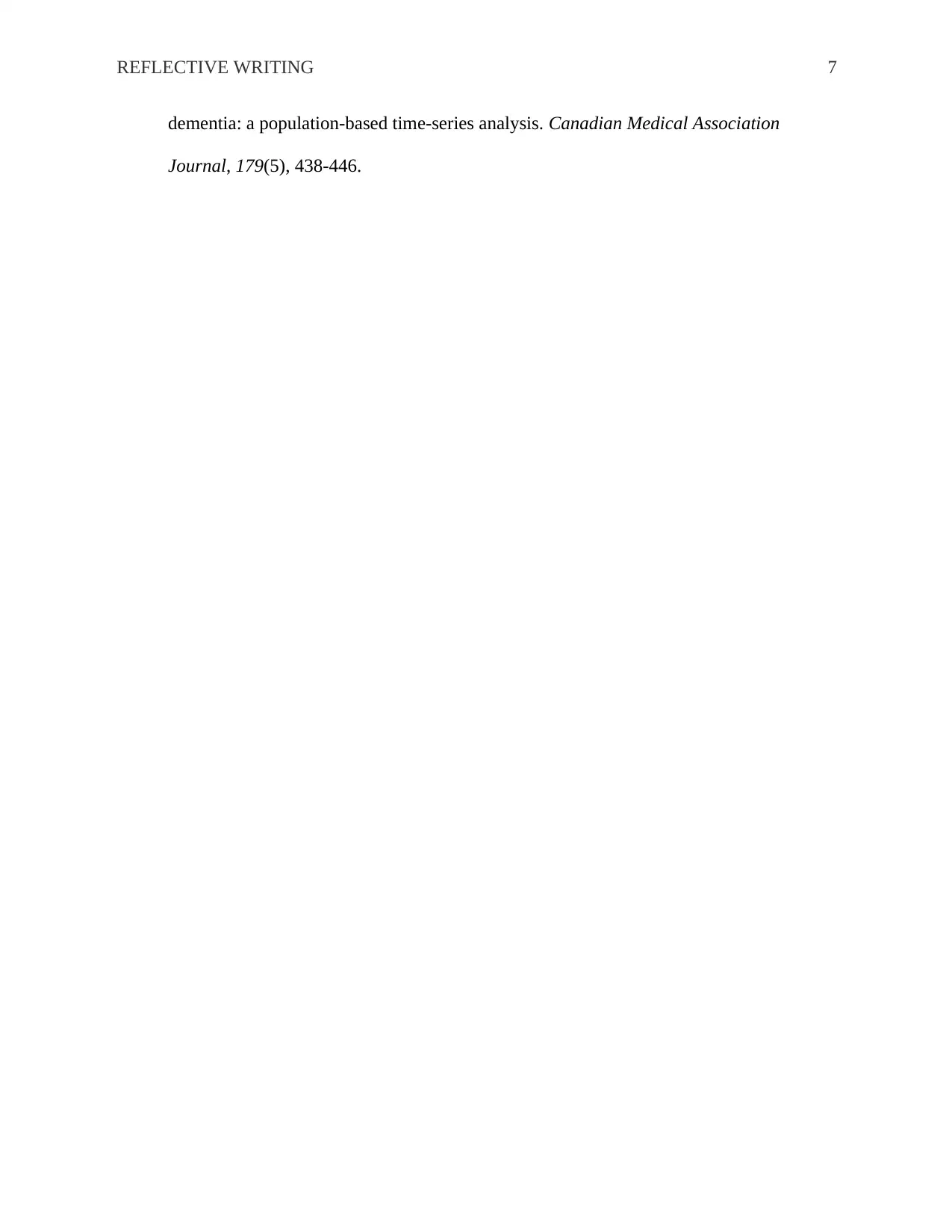
REFLECTIVE WRITING 7
dementia: a population-based time-series analysis. Canadian Medical Association
Journal, 179(5), 438-446.
dementia: a population-based time-series analysis. Canadian Medical Association
Journal, 179(5), 438-446.
1 out of 7
Your All-in-One AI-Powered Toolkit for Academic Success.
+13062052269
info@desklib.com
Available 24*7 on WhatsApp / Email
![[object Object]](/_next/static/media/star-bottom.7253800d.svg)
Unlock your academic potential
Copyright © 2020–2026 A2Z Services. All Rights Reserved. Developed and managed by ZUCOL.
